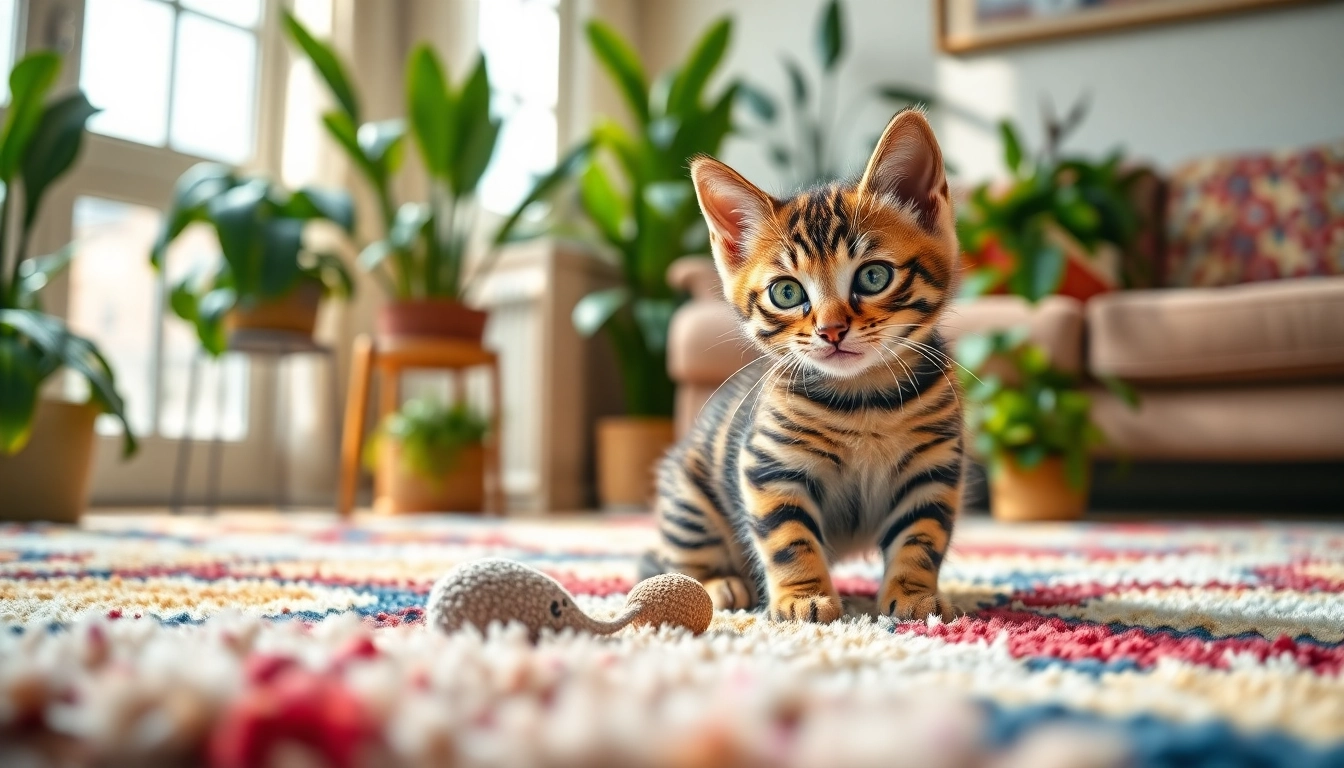Understanding Bengal Kittens: Origins and Traits
The Unique History of Bengal Cats
Bengal cats have a fascinating history that sets them apart from other breeds. Their roots trace back to the Asian leopard cat (Prionailurus bengalensis), which was crossed with domestic cats to create the Bengal breed that we know today. This hybridization began in the 1960s when breeders sought to combine the wild beauty of the leopard cat with the friendly nature of domestic cats. As a result, these cats possess unique traits, both physically and temperamentally, blending wild and domestic characteristics. Through careful breeding, Bengals have developed vibrant coat patterns and distinct spots or rosettes reminiscent of their wild ancestors.
Distinctive Physical Characteristics of Bengal Kittens
Bengal kittens are celebrated for their striking appearance, which features a sleek, muscular body and a short, soft coat. Their most notable trait is their stunning fur patterns, which can range from spotted to marbled. Bengals typically exhibit a wide variety of colors, including brown, snow, and silver; each pattern has its own distinct beauty. These kittens possess a unique glittered texture on their fur, which gives them a luxurious appearance. They have large, expressive eyes that can vary from green to gold, adding to their exotic allure. Their physical attributes are not only visually captivating but also indicative of their active, playful nature.
Temperament and Behavior: What to Expect
The temperament of Bengal kittens is as notable as their appearance. Known for their intelligence, curiosity, and energetic disposition, Bengals thrive in environments that stimulate their minds and bodies. They are typically friendly and social cats, often forming strong bonds with their human companions. These kittens enjoy interaction and play, requiring a stimulating environment with toys and activities to keep them engaged. However, early exposure to different stimuli and socialization with people and other pets is essential to ensure they develop into well-rounded, confident adults.
The Process of Acquiring Bengal Kittens for Sale
Steps to Finding Reputable Breeders
When looking for Bengal Kittens for Sale, finding a reputable breeder is crucial for ensuring the health and well-being of your new pet. Start by conducting research to identify breeders who are reputable and recognized. Look for those who have a strong online presence and are members of recognized breed associations, which often have breeder directories. Attend cat shows or events where you can meet breeders and their kittens in person. This engagement allows you to ask questions about their breeding practices, health guarantees, and the kittens’ early socialization experiences.
Evaluating Health and Wellbeing of Kittens
Once you’ve identified potential breeders, it’s time to evaluate the health and well-being of the Bengal kittens they offer. Reputable breeders will provide health clearances for genetic disorders common in Bengals, such as Hypertrophic Cardiomyopathy (HCM) and spinal issues. Ask for medical records and details about the vaccinations the kittens have received, as well as any deworming treatments. Furthermore, observe the living conditions. Kittens should be raised in a clean, safe environment with proper care and social interaction. Engaging with the kittens during your visit can also provide insight into their temperament and social skills.
Understanding Legal and Logistical Considerations
Before completing your purchase, it’s essential to understand any legal and logistical considerations surrounding the acquisition of Bengal kittens. Some states have specific regulations or restrictions regarding the ownership of hybrid cats due to their wild backgrounds. Research local laws to ensure compliance. Additionally, consider logistical aspects such as transportation—especially if the breeder is located far from your residence. Arranging for safe travel methods is a vital step in ensuring a smooth transition for your new kitten.
Caring for Your New Bengal Kitten
Ideal Living Environment for Bengal Kittens
Caring for a Bengal kitten requires creating an ideal living environment that caters to their active and social nature. Bengals thrive in spaces that allow for climbing and exploration. Consider investing in cat trees, shelves, or other vertical spaces that enable them to exercise and fulfill their natural instincts. It’s also essential to provide a safe area for rest, away from distractions, where they can feel secure. Keep in mind that Bengals are highly social animals; hence, they do better in homes where they have human companionship or the company of another pet.
Essential Supplies for New Owners
Equipping yourself with the right supplies before bringing a Bengal kitten home is crucial for ensuring comfort and well-being. Your supply list should include high-quality food and water dishes, a litter box, and litter that is appropriate for their preferences. Bengals benefit from toys that challenge their intelligence, such as puzzle feeders, interactive toys, and even laser pointers for active play sessions. Furthermore, providing scratching posts is essential to help them maintain their claws and satisfy their natural scratching behavior.
Nutrition and Health Care Guide
Bengal kittens require a balanced diet that supports their rapid growth and energetic lifestyle. Opt for high-quality, protein-rich cat food that contains real meat as the primary ingredient, avoiding fillers and by-products. It’s also essential to schedule regular veterinary check-ups to monitor their health. Vaccinations, spaying or neutering, and flea and tick prevention are all critical components of their overall health care. Keeping them up to date with these medical necessities will ensure they live a long, healthy life.
Socializing Your Bengal Kitten
Importance of Early Socialization
Socialization plays a pivotal role in the development of Bengal kittens. Early exposure to different people, pets, and environments is essential for shaping their personalities. Introduce them to various sounds, smells, and experiences in a controlled manner, ensuring it remains positive and enjoyable. Socialized Bengals tend to be more confident and adaptable as adults, which helps prevent behavioral issues such as anxiety or aggression.
Tips for Engaging Play Activities
Engaging your Bengal kitten in play activities is essential for their physical and mental stimulation. Create a diverse range of toys to keep them entertained; they enjoy interactive play, such as chasing wand toys or catching balls. Puzzle toys that dispense treats can also provide mental stimulation, while climbing structures encourage their natural tendency to explore. Frequent play sessions not only strengthen the bond between you and your kitten but also help them release pent-up energy.
Training Essentials for Bengal Cats
Training your Bengal kitten is an important aspect of cat ownership that can foster good behavior and a strong bond between you and your pet. Start with positive reinforcement techniques, rewarding your kitten for following commands and using the litter box appropriately. Basic training can help teach them to respond to their name, come when called, and even learn tricks. Remember to be patient and consistent, as Bengals are intelligent but can sometimes exhibit a stubborn streak.
Common Challenges and Solutions for Bengal Kitten Owners
Addressing Behavioral Issues
As with any breed, Bengal kittens may present certain behavioral challenges that owners need to address. Common issues include excessive biting or scratching, destructive behavior, and litter box problems. The key to managing these behaviors lies in understanding their needs. Ensuring they receive enough physical and mental stimulation will often mitigate problems like scratching furniture or biting during play. If your Bengal is exhibiting litter box issues, ensure the litter box is clean and accessible, and experiment with different types of litter.
Managing Health Concerns in Bengal Kittens
Bengals can be prone to certain health concerns, including genetic conditions like Hypertrophic Cardiomyopathy (HCM). Regular veterinary care is crucial for early detection and management of potential health issues. Maintaining a healthy diet and keeping your kitten at a proper weight will also contribute to their long-term health. Be observant of any changes in behavior or appetite, and consult your veterinarian promptly if you notice anything unusual.
Finding Support and Community Resources
Joining a community of Bengal lovers can be an invaluable resource for new owners. Consider connecting with local and online Bengal cat clubs or forums where you can share experiences and seek advice. These communities can provide insight on best practices for care and training, as well as offer support for various challenges. Engaging with fellow Bengal enthusiasts can enhance your experience as a pet owner and help you better understand the unique nuances of your Bengal kitten.






